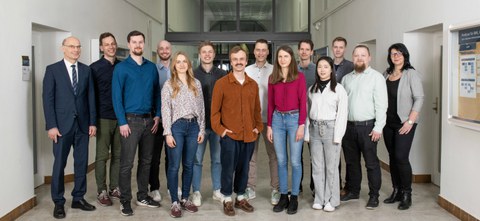Staff
Chair holder
 © Sven Ellger / TUD
© Sven Ellger / TUD
Prof. Dr. Udo Buscher
Send encrypted email via the SecureMail portal (for TUD external users only).
Visitors' Adress:
Fakultät Wirtschaftswissenschaften, Tillich-Bau, HÜL 502 (North wing) Helmholtzstraße 6/8
01069 Dresden
None
Office hours:
on appointment
Secretariat
 © Sven Ellger / TUD
© Sven Ellger / TUD
Secretariat
NameMs Cornelia Raeuber
Send encrypted email via the SecureMail portal (for TUD external users only).
Chair of Business Administration, in particular Industrial Management
Chair of Business Administration, in particular Industrial Management
Visiting address:
Fakultät Wirtschaftswissenschaften,
Tillich-Bau, Floor 3, North Wing Room N317
Helmholtzstr. 6/8
01069 Dresden
Postal address:
TUD Dresden University of Technology Professorship of Business Administration, in particular Industrial Management KST 1100103G
01062 Dresden
Office hours:
- Tuesday:
- 09:00 - 11:00
- 13:00 - 15:00
- Wednesday:
- 09:00 - 11:00
- 13:00 - 15:00
- Thursday:
- 09:00 - 11:00
- 13:00 - 15:00
Employees
| Operations Management | Applied Operations |
|---|---|
|
Dr. Benedikt Zipfel |
Dr. Martin Scheffler |
| Daniel Miodowski | |
| Paul Päprer |
| Prescriptive Analytics | Supply Chain Operations |
|---|---|
|
Florian Linß |
Dr. Maria Beranek (Head of working group) |
| Daniel Zähringer | Alexander Blume |
| Aron Lange | Shiyu Guo |
| Clover Optimization | ||
|---|---|---|
| Dr. Leopold Kuttner | Maurice Morabel | Felix Tamke |
Clover Optimization is a spin-off from the Chair of Industrial Management. Further information can be found here.
Our team works in the three working groups Operations Management, Prescriptive Analytics and Applied Operations. In the field of Operations Management, our main interest in research, teaching and transfer is to plan, design and control production and logistics systems. The focus here is on classic production management and thus the optimization of strategic, tactical or operational decisions in operational service provision. In particular, methods of operations research are applied.
The Applied Operations working group concentrates on the application of operations research methods to a variety of practical use cases, also beyond the industrial sector. The aim is to provide decision-making aids for real-life situations on the basis of the latest research findings. To this end, the transfer from theory to practice takes place in close, cross-working group exchange.
The Prescriptive Analytics team researches the interface between data analytics and operations research. Companies are collecting more and more data. On this basis, it is possible to determine why something has happened (descriptive/diagnostic analytics), but also what will happen in certain situations (predictive analytics). The logical next step is to use the latest mathematical optimization approaches to support and objectify future decisions in a data-driven manner.
The Supply Chain Operations working group focuses on the modeling and analysis of supply chains using quantitative methods. In particular, game theory methods are applied. These make it possible to take into account interdependencies between stakeholders within supply chains, to understand decision-making processes and to derive recommendations for practical action.
Student Assistants and tutors
| Max Hockeborn | Yang Chen | Gregor Loske |
| Yen Nhi La | Sarah Lumme | Lea-Sophie Rosenhagen |

